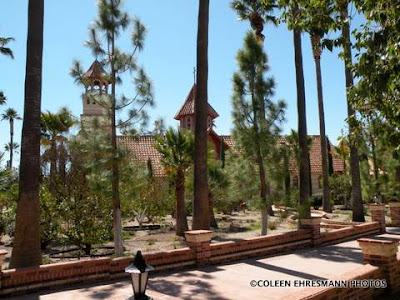

The Gatehouse
The bookstore is to the left
Upon their arrival, the fathers began the necessary construction: building first the main church, living quarters for monks, a dining hall, and guest facilities. As the monastery expanded, more chapels were built; a vegetable garden, a small vineyard, citrus orchards, and an olive grove soon followed. An elaborate system of gardens, pathways, gazebos and Spanish fountains truly render the monastery and extensive grounds an oasis in the desert. Join us as we walked through the chapels and grounds.

Before we could enter the grounds, we had to be properly attired.
Shirley's skirt slits had to be closed. A nun is helping Shirley pin the slits.

Most of the Vixen Nuns, properly attired and ready for the tour
Proper attire: All guests are to be appropriately and modestly dressed: men are to wear long pants and long sleeved shirts and women long skirts (well below the knee), long sleeved blouses and head scarves; a limited supply of clothing is available at the bookstore. A few of the Vixens took advantage of the skirts being offered during the tour.

The main church: St. Anthony's Church
Daily services are conducted in the traditional Byzantine style, a domed basilica church. There are no pews in the church; the monks normally stand during the services in the tall seats, the stasidia, placed along the walls; of course they can sit in them as well when they get tired. Almost everything that we saw was brought from Greece. No electric lights are used in the church except the two fixtures over the chanter's stands. The big brass chandelier represents the Heavenly Church. The altar is located behind the curtain; which is off limits to visitors.

Brass chandelier representing the Heavenly Church
Icons along the front of the church came from Greece

The altar in the center of the photo
Chanters stand on the right

The ornate workmanship on the chandelier

The ornateness of the icons

The detail on the wood carving on the Bishop's Throne

St. Nicholas' Chapel
St. Nicolas the Wonderworker, the patron saint of the sailors, is the most beloved saints of the orthodoxy. This chapel is an exquisite example of Byzantine architecture. Church Services are conducted from 1:30 AM to 4:30 AM. The three hour service includes Midnight hour, Matins, and Divine Liturgy. Sometimes the Divine Liturgy is held in the St. Nicholas' Chapel instead of in St. Anthony's Church.

Some of the new nuns walking the Main Courtyard
The monk's cells were on the right of the courtyard
The women's guesthouse was on the left of the courtyard
There are adjoining housing complexes for visiting bishops,
priests and men.

Some of the guest housing

There are three members of the new order

Doorway from the narthex to the nave of St. Nicholas' Chapel

Two sisters taking advantage of the stasidia

The candles on the chandelier are lit on major feast days

The altar is behind the curtain

One of many fountains

Grapefruits in the citrus orchard

The Chapel of St. George

More detailed wood carving

The ornate chandelier in the Chapel of St. George
The Divine Liturgy is sometimes served here as well

The architecture of this chapel is typical Romania,
but all the furnishings were brought from Greece

The stained glass window above the door

The bell tower behind some of the sisters

Camera shy????

A big metal cross

The turrets of St. George

A very small patch of green grass; the ONLY green grass

Flowers along the pathway

Beautiful wide pathways between the chapels

Another fountain

On the pathway to St. Demetrios' Chapel

Another bell tower

Kitty made an appearance
Is it a Holy Cat?

The altar, chandelier, and icons in St. Demetrios
St. Demetrios' Chapel is a rural Russian-style chapel with a golden dome. (I missed that part.) St. Demetrios was a 4th century Duke of Thessalonica who was martyred for his faith in Christ and his relics remain fragrant to this day; thus he is called the myrrh-gusher.

Lace cloth covering the small table in the small narthex
of the small chapel

Three-bar stone cross
This is the traditional Orthodox cross, also called the Russian cross; the top small bar is the sign that was placed on the cross with the inscription "Jesus the Nazarene, King of the Jews", the second bar is for the hands. The bottom bar is the footrest; the reason it is slanted is this: the thief crucified on the right of Christ was saved, he went up to heaven; the other thief went doen to Hell. Therefore, the right end of the bar points up to heaven and the left end is down to Hell.

Some of the beautifully, but modestly attired nuns

A spot of color near the fountain

Another walk way

Two of the nuns

The nuns are gathering

A couple more nuns
Some of the many items for sale in the bookstore-gift shop
Several in our group took advantage and bought some of the
homemade breads and baked Greek delights made in the
monastery kitchen.
St. Anthony's Monastery is home to 45 monks and novices following the coenobitic rule of monastic life. The brotherhood holds all things in common and follow a daily schedule of prayer and work under obedience to the abbot, their spiritual father. The monk's daily program begins an hour or two before midnight with personal prayer time and spiritual reading, followed by the cycle of morning prayers and Divine Liturgy. After a light breakfast and rest period, the monks begin their work day attending to prayer and their tasks until evening. Tasks include, among others, grounds keeping, tending the various gardens, orchids, and the vineyard, construction, woodworking, publishing, food preparation and offering hospitality. The day ends with Vespers followed by dinner and Compline.

The newest chapel, St. Elijah
Pictures of lunch later in the week!
You will be able to actually see and
identify the Vixen Nuns.

No comments:
Post a Comment